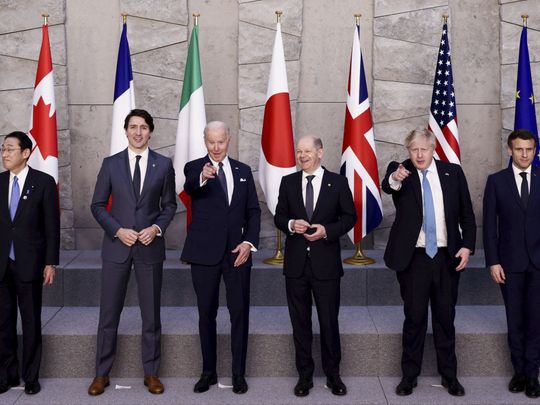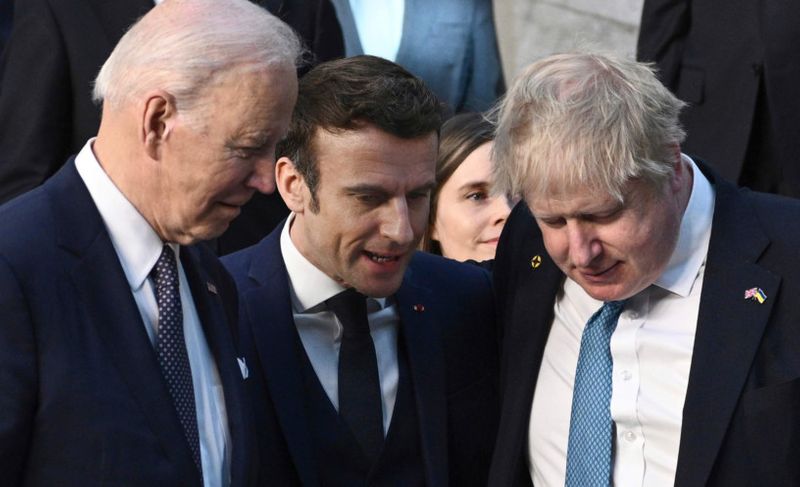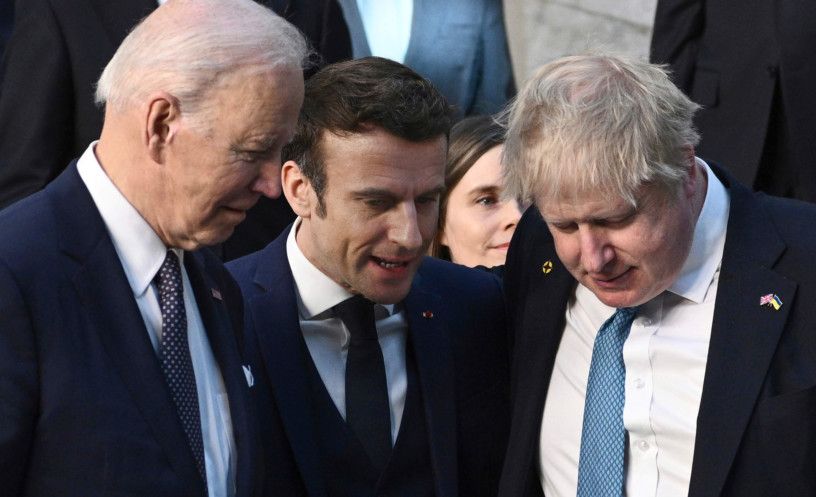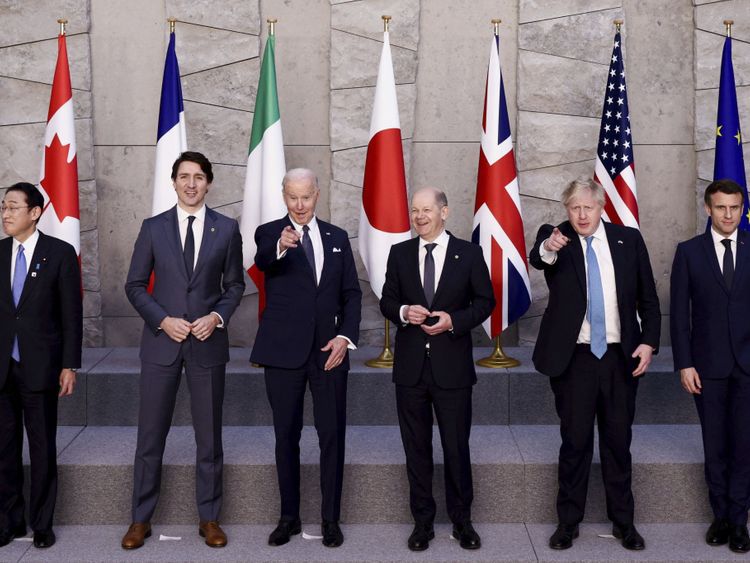
BRUSSELS/LVIV/MARIUPOL: Western leaders meeting in Brussels on Thursday agreed to strengthen their forces in Eastern Europe, increase military aid to Ukraine and tighten their sanctions on Russia as Moscow’s assault on its neighbour entered its second month.
In a display of unity at an unprecedented triple summit of NATO, the G7 and the European Union, the military alliance announced new battle groups to be stationed in four Eastern European countries.
The United States and Britain expanded their sanctions blacklists. Countries announced new packages of military and humanitarian aid and promises to take in refugees. The EU was due to announce steps to wean itself off Russian energy.
“We agreed to strengthen our deterrence and defence for the longer-term. We also agreed to give further support to Ukraine and to continue to impose costs on Russia,” NATO Secretary General Jens Stoltenberg said after leaders gathered at NATO headquarters.
Still, those pledges stopped short of President Volodymyr Zelenskiy’s calls for a full boycott of Russian energy products and a no-fly zone over Ukraine, where thousands of people have been killed, millions become refugees, and cities pulverised since Russian leader Vladimir Putin unleashed his invasion on Feb. 24.

Russia’s foreign ministry says Poland’s actions are guided by “Russophobia” which it claims NATO has “elevated to the rank of official policy”.
Zelensky plea for planes, tanks: Ukrainian President Volodymyr Zelensky urges NATO members meeting in Brussels to provide Kyiv with offensive weapons, including tanks and fighter jets, one month into Russia’s attacks. Addressing a Nato summit by video-link, he says the alliance can prevent Ukrainian deaths “by giving us all the weapons we need”.
Currently Nato members are only supplying Kyiv with defensive equipment.
Nato boosts defences: Nato leader Jens Stoltenberg says alliance members meeting in Brussels will agree to “major increases of forces” on the alliance’s eastern borders, including four new battle groups in Bulgaria, Hungary, Romania and Slovakia.
Phosphorus bombs: Zelensky accuses Russia of using phosphorus bombs as does the governor of the eastern Lugansk region, who says the explosives were used in one village hit in overnight strikes that killed at least four people, including two children.
Britain’s ITV network broadcasts footage of phosphorus bombs dropping overnight on the flashpoint town of Irpin near Kyiv.
Anti-ship missiles: A senior US official attending the Nato summit in Brussels says alliance members are discussing sending anti-ship missiles to Ukraine to counter attacks from Russian vessels on Ukraine’s Black Sea ports.
Kharkiv hit: Russian strikes on the eastern city of Kharkiv kill at least six civilians and wound more than a dozen others near a post office.
Ukraine taking back ground - Britain: British military intelligence says Ukraine is driving back Russian forces from the northwestern approach to Kyiv - echoing reports from the Pentagon that Ukrainian forces have taken back some lost ground after weeks of being on the defensive.
British intelligence says Ukrainian forces had “probably retaken” the towns of Makariv (70 kilometres west of Kyiv) and Moschun (35 kilometres northwest of Kyiv).
US to take 100,000 refugees: The White House says the US will take in up to 100,000 refugees and provide an extra $1 billion in humanitarian aid to those impacted by the war.
Half of Ukraine’s children displaced: The UN children’s agency Unicef says the month of fighting in Ukraine has displaced 4.3 million children - more than half of Ukraine’s estimated 7.5 million children.
“This is a grim milestone that could have lasting consequences for generations to come,” Unicef chief Catherine Russell says.
UNICEF said on Thursday more than half of Ukraine’s children had now been driven from their homes.
In the besieged southern port of Mariupol, hundreds of thousands of people have been hiding in basements with no running water, food, medicine or power.
In a part of the city now captured by Russian troops, a patch of grass between charred hulks of blasted apartment buildings had become a makeshift graveyard, with freshly-dug mounds marked with plastic flowers and crosses made from broken window frames.
The thud of explosions could be heard in the distance when a Reuters team reached there on Wednesday.
Viktoria was burying her 73-year-old stepfather Leonid, killed when the car ferrying him to a hospital was blown up 12 days ago. He had taken her seat in the car, she told Reuters, pointing to the mangled remains of the vehicle.
“It could have been me,” she sobbed.
Ukrainian officials accused Russia on Thursday of having forcibly deported 15,000 people from the city to Russia. Moscow denies this.
‘RUINOUS COSTS’
In a month of fighting, Ukraine has fended off what many Western military analysts had anticipated would be a quick Russian victory.
So far Russia has failed to capture a single major city. Its armoured columns have barely moved in weeks and are stalled at the gates of the capital Kyiv while besieging cities in the east. They have taken heavy casualties and are running low on supplies.
Ukrainian officials say they are now shifting onto the offensive in much of the country and have pushed back Russian forces, including north of Kyiv.
“In some sectors the enemy was driven back by more than 70 km (44 miles), in some sectors the enemy is at a distance of 35 km,” Defence Ministry spokesperson Oleksander Motuzyanyk told a briefing.
Also read
Ukraine said its forces had destroyed the Russian landing ship the “Orsk” at the Russian-occupied port of Berdyansk on the Azov Sea.
Video footage, which Reuters confirmed was filmed from inside Berdyansk, showed a column of smoke rising from a blaze at a dock and the flash of an explosion. Russian officials did not immediately respond to requests for comment.
Faced with the biggest military crisis in Europe since the Balkans wars of the 1990s, Western leaders huddled in Brussels for a day of emergency summits of NATO, the G7 and the EU.
“We must ensure that the decision to invade a sovereign independent country is understood to be a strategic failure that carries with it ruinous costs for Putin and Russia,” Canadian Prime Minister Justin Trudeau told the EU parliament.
HUMANITARIAN CRISIS
Tens of thousands of people are still believed to be trapped inside Mariupol under Russian bombardment, having had no access to food, power, water or heat since the war’s early days.
Satellite photographs from commercial firm Maxar showed massive destruction of what was once a city of 400,000 people, with residential apartment buildings in flames.
Journalists have not been able to report from inside the Ukrainian-held part of Mariupol for 10 days, during which time Ukraine says Russia has bombed a theatre and an art school being used as bomb shelters, burying hundreds of people alive.
In the Russian-held part of the city, trucks arrived with food supplies in cardboard boxes bearing the “Z” logo that has become the Russian symbol of its “special operation”. Hundreds of people, many elderly, had emerged from the surrounding ruins, queuing mostly in silence as men in Russian emergencies ministry uniforms distributed the boxes.
Angelina, a young mother of two, said she had received bread, nappies and baby food.
“It’s difficult to leave by bus now. We hope the number of people trying to get out will go down and it will get easier for us to leave,” she said.
Ukraine’s armed forces chief of staff said on Thursday Russia was still trying to resume offensive operations to capture the cities of Kyiv, Chernihiv, Sumy, Kharkiv and Mariupol.













